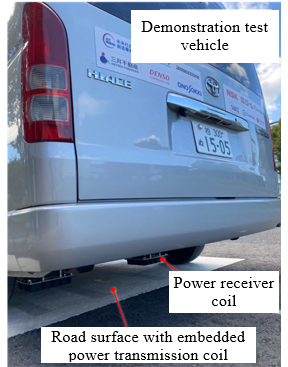Japan’s First Public Road
Demonstration Test of In-Transit Power Supply to Electric Vehicles Begins at Kashiwa-no-ha Smart City
October 3, 2023
The University of Tokyo
Bridgestone Corporation
NSK Ltd.
ROHM Co., Ltd.
TOYO ELECTRIC MFG. CO., LTD.
Ono Sokki Co., Ltd.
DENSO CORPORATION
Mitsui Fudosan Co., Ltd.
SWCC Corporation
CAR MATE MFG. Co., Ltd.
Chiba University
Summary
A joint research group comprising H. Fujimoto & O. Shimizu & T. Fujita & S. Nagai Lab of the Graduate School of Frontier Sciences at the University of Tokyo, Bridgestone Corporation, NSK Ltd., ROHM Co., Ltd., TOKYO ELECTRIC MFG. CO., LTD., Ono Sokki Co., Ltd., DENSO CORPORATION, Mitsui Fudosan Co., Ltd., SWCC Corporation, CAR MATE MGF. Co., Ltd. and Miyazaki Lab of Chiba University (hereinafter the “Research Group”) has been researching a system for in-transit power supply since 2018.
The Research Group will begin Japan’s first “public road test of in-transit power supply” inside Kashiwa-no-ha Smart City. The test will be conducted under the “initiative for developing in-transit power supply technology for electric vehicles” under a framework comprising the University of Tokyo, Kashiwa City, other relevant organizations, and the Kashiwa ITS Promotion Council.

Structure of vehicle and road surface used in the demonstration test
■Japan’s First Public Road Demonstration (Kashiwa City)
In an area centered on Kashiwanoha-campus Station, a collaboration between the public, private, and academic sectors is under way to create an advanced town under the Kashiwa-no-ha International Campus Initiative. Moreover, a range of initiatives to create a smart city are also being conducted, and in 2019, the Smart City Execution Plan was formulated after being selected by a Ministry of Land, Infrastructure, Transport and Tourism as a model project for a smart city (advanced model project). The project is working to eliminate urban and regional issues while utilizing new technologies and public- and private-sector data.
Part of the project is a demonstration test of in-transit power supply to electric vehicles, under a framework comprising Kashiwa City, the University of Tokyo, other relevant organizations, and the Kashiwa ITS Promotion Council.*1 This project was adopted as an “on-site demonstration test (social experiment) of new initiatives related to roads,” under a call for applications by the Ministry of Land, Infrastructure, Transport and Tourism.*2 From October 2023 to March 2025, Japan’s first demonstration test of technology for in-transit power supply to an electric vehicle is to be held on streets near the West Exit of Kashiwanoha-campus Station to verify the technology and confirm public acceptance.
This social experiment is expected to make a significant contribution to curbing the progression of global warming by realizing a low-carbon transportation system, as stated in the roading policy vision, “2040 Vision for Roads in Japan.”*3
- 1 Kashiwa ITS Promotion Council http://www.kashiwa-its.jp/ (In Japanese)
- 2 Kashiwa City The project to demonstrate technology for in-transit power supply on public roads was adopted as a social experiment by the Ministry of Land, Infrastructure, Transport and Tourism (announced June 20, 2023) https://www.city.kashiwa.lg.jp/koho/pressrelease/r5houdou/6gatsu/r5063001.html (In Japanese)
- 3 Ministry of Land, Infrastructure, Transport and Tourism
2040 Vision for Roads in Japan
https://www.mlit.go.jp/road/vision/01.html (In Japanese)
■Research and Development of In-Transit Power Supply System (The University of Tokyo)
The research group of Professor Hiroshi Fujimoto and Assistant Professor Osamu Shimizu of the Graduate School of Frontier Sciences at the University of Tokyo (hereinafter the University of Tokyo Group) has been promoting research and development of an in-transit power supply system, selected by the JST-Mirai Program as a project for a “society of the future enabled by direct power supply to electric vehicles.” Currently, the University of Tokyo Group is pursing joint research with Bridgestone Corporation, NSK Ltd., ROHM Co., Ltd., TOKYO ELECTRIC MFG. CO., LTD., Ono Sokki Co., Ltd., DENSO CORPORATION, Mitsui Fudosan Co., Ltd., SWCC Corporation, CAR MATE MGF. Co., Ltd. and Chiba University (hereinafter the “Research Group”). This demonstration test will introduce systems and technologies that have been researched and developed by the Research Group. Moreover, since the demonstration test will be conducted on public roads, it will be conducted with vehicles that are fitted with an in-transit power supply system and that have a vehicle registration number.
The power transmission coil used in this demonstration test have been designed by the University of Tokyo Group to a specification that enables a general electric vehicle to run for 1 km after charging for 10 seconds.
The following are the three main points of this announcement.
- An in-transit power supply system that can be used with different kinds of vehicles
To enable use of the system with different kinds of vehicles in any condition, it is necessary to control the electric power appropriately. The Research Group has realized an in-transit power supply system that can be used with electric vehicles and plug-in hybrid vehicles by appropriately controlling the electric power. - An in-transit power supply system that promotes standardization
If the transmission coil is constantly energized, it will waste energy when there are no vehicles above it. To solve this issue, the Research Group is developing a new vehicle detection system that can detect vehicles in a short time while minimizing standby power. Testing this system on public roads will contribute to standardization of the in-transit power supply system. - Highly durable pre-cast coil
To enable safe usage of the system, it is necessary to develop a coil that has sufficient durability as a road surface while also being capable of transmitting power. The Research Group is testing the durability of a pre-cast coil integrated with the road surface to determine whether it can withstand the public road demonstration test.
■Future outlook
The demonstration test on a public road is scheduled to be conducted continuously from October 2023 to March 2025. The results of the test will be reflected and used to promote the development of a further enhanced in-transit power transmission system, aiming to realize social implementation of in-transit power transmission at an early stage.


























